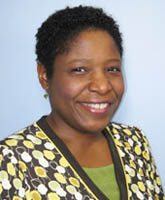
Both racism and obesity are significant problems independent of one another.
Yvette Cozier, assistant professor of epidemiology at Boston University, suggests these issues are intertwined in the lives of some African-American women.
Dr. Cozier is an investigator on the Black Women’s Health Study (BWHS), a prospective follow-up of over 59,000 African American women begun in 1995. Dr. Cozier’s overall research focus is on the influence of psychosocial factors in the development of sarcoidosis, obesity, cardiovascular disease, and cancer. She has published several analyses of perceived racism in relation to hypertension, breast cancer incidence, weight gain, and mortality in the BWHS. In addition, she has published analyses of neighborhood socioeconomic status, including median household income and segregation, on the risks of hypertension, and diabetes. For the past several years, Dr. Cozier has been studying selected risk factors for sarcoidosis in the BWHS, including reproductive factors and genetic polymorphisms. She has also assessed the role of attitudes about spirituality and religiosity in health promotion and disease prevention efforts among Boston-area residents and clergy.
Obesity & Racism

Approximately half of African American women are currently classified as obese and it is estimated that 70% will be obese by 2020. Racism is a form of stress that African Americans experience more than any other group. In animal and human studies, chronic exposure to stress can result in dysregulation of important neuroendocrine functions which can in turn influence the accumulation of body fat.
We conducted an analysis of perceived racial discrimination in relation to the incidence of obesity in the Black Women’s Health Study, a longitudinal study of 59,000 African-American women aged 21-69 followed since 1995. Throughout follow-up, participants completed biennial questionnaires, providing data on many factors including demographics, behaviors, and height and weight. Most adult weight gain occurs before middle age so we restricted the analyses to women under the age 40 at the beginning of follow-up. Participants were asked to rate the frequency of “everyday” experiences of racism, such as receiving poorer service in restaurants and stores, and “lifetime” racism, such as being treated unfairly because of their race on the job, in housing or by the police. Women in the highest category of reported everyday racism in both 1997 and 2009 were 69% more likely to become obese compared to those in the lowest category at both intervals. Women who reported more lifetime racism were also at increased risk of obesity.
These results suggest that experiences of racism contribute to the high prevalence of obesity among African American women. Work-place- and community-based programs to combat racism and interventions to reduce racism-induced stress could be an important component of strategies for prevention of obesity, especially in communities at high risk.


Comments
3 responses to “Yvette Cozier, Boston University – Obesity & Racism”
How do we know the discrimination is not due to their weight?
I find the logic in this academic minute puzzling. First and foremost the correlation of intelligence between Homo sapiens and Metazoa (the animal kingdom) in regard to social patterns. This violates Euclid’s first axiom that states(Euclid’s is considered to be the father of modern logic and mathematics) “Things equal to the same thing are equal to one another”. Clearly if you were to compare the IQ(IQ is an integral part of forming complex social patterns.) number between that of a person and that of a Metazoa(which is probably a mouse based on the research by Mario R. Capecchi, Martin Evans, and Oliver Smithies in 1989, for The first recorded knockout mouse for which they were awarded the 2007 Nobel Prize in Physiology or Medicine.) Would evidently not be equal. The second deduction that puzzles me is the contrapositive(The hypothesis and conclusion are converted and then contradicted. Producing the logically equivalent.) of this argument should be true; meaning the study should also apply to the “White South African” demographic which is about 8.4% of South Africa’s population (Estimate of 2014) should also be true considering that the premises of this academic minute is based on the two factors of skin pigment and the demographic being a minority group) but this does not seem to be the case in “White South African”.
I’m wondering if sexism could play a similar role – do African American women show a greater accumulation of body fat than their male African American peers?